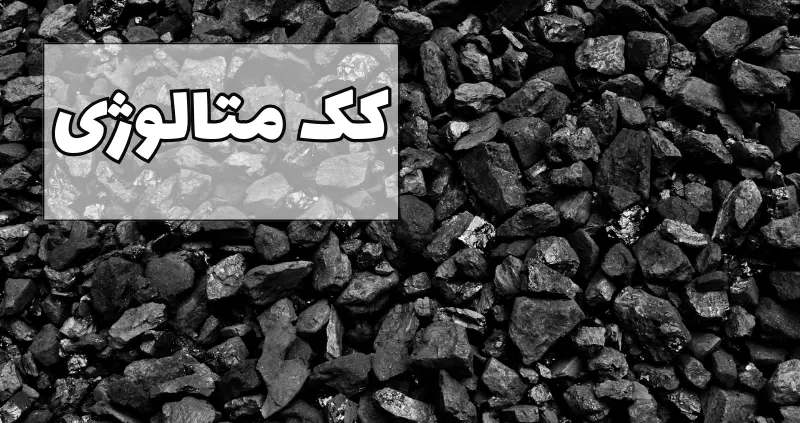
Coke, this amazing solid black coal, is not only a fuel, but also one of the keys to the world of metals. In the heart of the steel and iron industries, coke plays a central role and feeds the heat treatment and regeneration of metals as a vital resource.
From the distant past, humans have depended on this great and powerful substance to obtain pure metals and make complex alloys. Coke, with its unique combination of compressed carbon and porous structure, provides the ability to transfer heat and regenerative gases efficiently and sustainably.
But the coke production process is an art in itself. With care and expertise, the selected coals are heated in huge furnaces and become a magical substance in which complex carbon molecules are placed in an orderly and coherent manner. This process is important not only for the metal industry, but also for the preservation of the environment; Because pollutant control and waste management are an integral part of it.
Definition of metallurgical coke
Metallurgical coke refers to the solid product obtained by cooking coal in the absence of oxygen. This process, known as “coking,” changes the chemical structure of the coal and produces a hard, porous, carbon-rich material. Metallurgical coke has special properties such as high thermal and mechanical resistance, suitable porosity for gas flow and no ash production during burning.
Metallurgical coke plays a key role in metal industries, especially iron and steel production. In these industries, coke is used as a fuel and a source of regenerative carbon to reduce metal oxides. The porous structure of coke allows reducing gases such as carbon monoxide to easily flow through the furnaces and allow the chemical reactions necessary to produce pure metals to occur.
In addition to metallurgical applications, metallurgical coke is also used in other industries. For example, in the production of graphite electrodes for electric arcs, the carbon source is used in the production of metallurgical silicon and other industrial applications. However, the production and consumption of metallurgical coke is also associated with environmental challenges, including the release of pollutants and the generation of solid wastes that require proper management.
Raw materials and production process of coke
The main raw materials for the production of metallurgical coke are special types of coal, which are selected based on their chemical and physical properties. Fatty coals (bituminous) with medium to high volatile matter content are a suitable option for coking. These coals contain significant amounts of hydrogen, oxygen and nitrogen, which are released during the coking process.
In addition to coal, other additives may also be used in the coal mixture to produce coke. These additives include binders such as coal tar, pectin, or synthetic resins that help increase coke adhesion and integrity. Also, regulating materials such as organic or inorganic salts may also be added to control the final properties of the coke.
The production process of metallurgical coke consists of several stages. First, coal raw materials and additives are mixed and prepared. This mixture is then loaded into vertical or horizontal coking ovens. Furnaces are placed at high temperatures of 1000 to 1400 degrees Celsius and in the absence of oxygen to carry out the baking and coking process. During this process, gases and volatile compounds are removed from the coal, leaving solid coke.
After finishing the cooking process, the produced coke must be cooled quickly to avoid undesirable changes in its structure. This step is usually done with water or air. The cooled coke is then packaged and prepared for use in the metal industry or other applications. It should be noted that during the coke production process, side gases and valuable chemical products are also produced that can be separated and used.
Physical and chemical properties of metallurgical coke
The physical and chemical properties of metallurgical coke play a key role in its performance in industrial processes. Chemically, metallurgical coke consists mainly of pure carbon with a high proportion of aromatic compounds. This unique combination gives metallurgical coke high thermal resistance and chemical stability against reducing gases such as carbon monoxide and hydrogen.
Physically, metallurgical coke has a porous and hard structure. Its porosity allows reducing gases and gaseous products to flow easily during metallurgical processes. Coke’s hardness and high mechanical strength allow it to withstand the heavy load of upstream materials in blast furnaces without crushing or collapsing.
Another important property of metallurgical coke is the absence of ash production during combustion. This unique feature is due to the high purity of carbon in the coke structure. In metallurgical processes such as blast furnaces, it is very important not to produce ash from coke, because ash can clog gas channels and disrupt the process. This feature makes metallurgical coke a very valuable material in the metal industry.
Know more: graphite
Applications of metallurgical coke
The main and well-known application of metallurgical coke is in the steel industry. In this industry, coke plays the dual role of fuel and renewable carbon source. In blast furnaces, coke is loaded together with iron ore and limestone. During burning, coke provides the necessary heat to melt iron ore and produce reducing gases such as carbon monoxide. These gases regenerate iron oxides and help produce pure iron.
In addition to the steel industry, metallurgical coke is also used in the iron industry and the production of other metals. In electric arc furnaces for iron and steel production, graphite electrodes are made from metallurgical coke. Also, in the production of non-ferrous metals such as magnesium, silicon and ferroalloys, coke is used as fuel and a source of regenerative carbon.
Other applications of metallurgical coke include the production of various types of carbon electrodes for electric arcs, carbon filters in the chemical industry, and even in the production of some refractory and thermal insulation materials. However, due to environmental constraints and efforts to reduce greenhouse gas emissions, possible alternatives to coke have been explored in some applications. But in the metal industry, metallurgical coke still plays an irreplaceable role.
